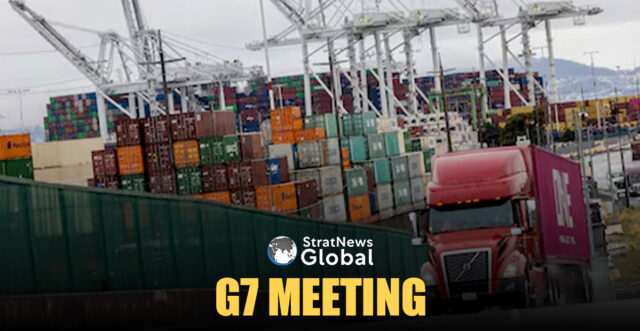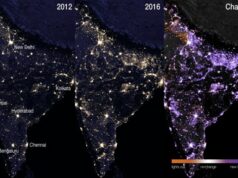Finance leaders from the Group of Seven democracies (G7) will aim to present a united front this week, focusing on issues such as economic security, Ukraine, and artificial intelligence cooperation, while steering clear of United States President Donald Trump‘s tariff policies.
But mostly, they’ll want to keep the powerful Western policy alliance from fracturing, even if it means less-specific language and agreed actions, according to G7 officials and economic diplomacy experts.
U.S. Treasury Secretary Scott Bessent will join G7 finance leaders and central bank governors in Banff in Canada’s Alberta, from Tuesday to Thursday, with tensions over Trump’s steep new tariffs set to dominate the discussions.
Reciprocal Duties From July
G7 members Japan, Germany, France and Italy all face a potential doubling of U.S. “reciprocal” duties to 20% or more in early July.
Britain negotiated a limited trade deal that leaves it saddled with 10% U.S. tariffs on most goods, and host Canada is still struggling with Trump’s separate 25% duty on many exports.
“No one expects this to be a big moment where the U.S. declares that for G7 and other partners, there will be a special regime that’s more favourable,” said Charles Lichfield, deputy director of the Atlantic Council’s GeoEconomics Center in Washington.
But ministers from the other six countries will likely try to tactfully remind Bessent that they are the closest U.S. allies and that it’s difficult for them to meet Washington’s demands that they exert economic pressure on China when they are facing U.S. coercion themselves, Lichfield said.
Economic Fundamentals
A Treasury spokesperson said on Sunday that Bessent would seek to get the G7 “back to basics and focused on addressing imbalances and non-market practices in both G7 and non-G7 countries.”
Bessent, a former hedge fund manager, has consistently called for pushback against China’s state-led, export-driven economic model that has fueled excess production capacity and a flood of subsidised goods into market economies.
In bilateral meetings with Bessent, some of the ministers are expected to further their own negotiations to lower Trump’s tariffs.
Bessent is leading the negotiations with Japan, which has been described by administration officials as being in advanced talks with the U.S.
The Treasury secretary said on Sunday that countries that don’t negotiate “in good faith” will again face the higher reciprocal tariff rates that Trump imposed on April 2 — 24% in Japan’s case.
Bessent is widely seen as a moderating influence on Trump’s trade agenda, so G7 ministers will “encourage him to push for more moderate administration policies on trade,” said Mark Sobel, a former U.S. Treasury and International Monetary Fund official who is U.S. chairman of OMFIF, an independent financial policy think-tank.
Tricky Language
Despite disagreements over tariffs, G7 officials, especially from host Canada, appear determined to agree on a joint statement from the finance meeting, which will set the stage for a G7 leaders’ summit in June in the nearby mountain resort area of Kananaskis.
G7 government sources familiar with the finance negotiations said that a draft communique was already prepared and that Canada was pushing to achieve a consensus to show that the G7 countries were standing together on a range of issues.
These are expected to include a broad statement of support for Ukraine in its struggle against Russia’s full-scale invasion, with Ukrainian Finance Minister Serhii Marchenko in attendance and the EU readying a new package of sanctions to increase pressure on Moscow.
Any statement on Ukraine will be far less specific than the G7’s last joint finance statement in October 2024, which announced terms for $50 billion in loans to Ukraine backed by earnings from frozen Russia’s sovereign assets.
The Atlantic Council’s Lichfield said that after the failure of ceasefire talks in Istanbul on Friday, which were spurned by Russian President Vladimir Putin, Bessent and fellow G7 ministers may be more likely to agree on some language supportive of increased sanctions pressure without actually committing to take specific action.
Another area for common ground is likely to be on support for the IMF and World Bank after Bessent reaffirmed U.S. backing for the institutions in April.
G7 Targets Financial Crimes
G7 sources said that cooperation to fight money laundering and other financial crimes is another topic where agreements are reachable, as well as on Bessent’s call for stronger reliance on the private sector to drive growth.
But given Trump’s opposition to the previous U.S. green energy agenda, language on climate change is expected to be a source of discord.
How the G7 will describe the economic uncertainty and stalled investment unleashed by Trump’s tariffs without explicitly blaming his policies is another thorny issue in the negotiations.
“My crystal ball is so murky now, I can’t really see the future very well,” said Suzanne Clark, CEO of the U.S. Chamber of Commerce, at a conference in Ottawa of business leaders from the G7 countries.
“I think we have to advocate for the future … (where the business community globally can share values of democracy and rule of law, enterprise and open market,” she added.
(With inputs from Reuters)





